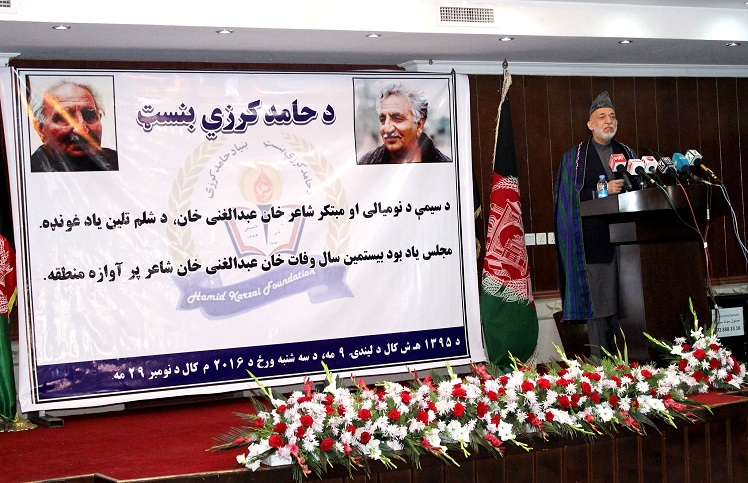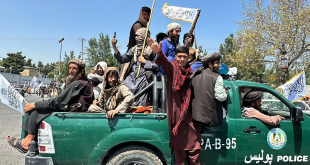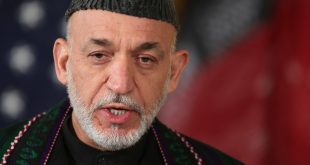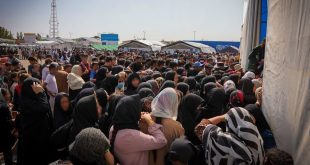Ghani Khan immortal in hearts of the people; the nationalist poet wanted his people educated; the philosophic poet was truly a compassionate person;
By M. Nadeem Alizai-KABUL: Twentieth death anniversary of the modern Afghan-Pashtun poet and artist of the 20th century, Khan Abdul Ghani Khan, was commemorated here on Tuesday.
In the commemoration ceremony, organized by the Hamid Karzai Foundation, hundreds of poets, academicians, writers, researchers, current and former Afghan officials and nationalists from Khyber Pakhtunkhwa and Balochistan participated.
Ex-Afghan President Hamid Karzai, President Awami National Party (ANP) Asfandyar Wali Khan, Former National Security Advisor (NSA) Dr Rangin Dadfar Spanta, ex-chief of the National Directorate of Security Amrullah Saleh, and Chairman of the New National Front of Afghanistan Anwarul Haq Ahadi were among the distinguished speakers on the occasion.
In his welcome address, Dr Spanta said that Ghani Khan, also widely known as ‘Lewanay Falsafi’, is a hero of Afghan people living on both sides of the Durand Line.
“Ghani Khan’s poetry and philosophy has important place in Afghanistan and the region. Bacha Khan’s political struggle has deep imprints on Ghani Khan. Bacha Khan [Khan Abdul Ghaffar Khan] was working for democracy, human rights, national unity and foreign occupation. He was imprisoned by the British Empire and Pakistani government. Ghani Khan was also put behind bars,” he said.
Ghani Khan was always thinking about creation of human beings, life purpose and problems, the former NSA said, adding that Ghani Khan also challenged taboos and clerics because he was a humanist.
According to Spanta, the high rate of illiteracy made the philosopher-poet more upset than anything else.
Hamid Karzai said that Ghani Khan had a multi-dynamic personality. “Ghani Khan was not only a great poet, but also a renowned artist, philosopher, and sculptor. His poetry style was new and unique. His poetry is totally different from others,” the former president said.
He said that Ghani Khan is immortal in hearts of the people.
Ghani Khan’s poetry was translated into English and Russian languages, said Karzai, adding that the noted philosopher-poet has not gained the international fame that was required because “we are backward and no one knows about us.”
He said that Ghani Khan has not been forgotten and would always be remembered.
Asfandyar Wali Khan, nephew of Ghani Khan and leader of the ANP, said that his uncle was at odds with clerics because the latter were not showing the real and soft image of Islam.
“My uncle [Ghani Khan] once told me that there is no difference between him and mullahs, except that the clerics always say that God is Qahhar [ever dominant] and Jabbar [the restorer], and he was saying that Allah is Rehman [most kind] and Raheem [most merciful],” Asfandyar recalled.
Leader of the ANP said that Ghani Khan was a highly-education person because he did his masters in sugar technology from the United States in 1932.
“Ghani Khan loved me more than my father. He was truly a compassionate person,” he said.
Amrullah Saleh said that Ghani Khan loved his nation in such a way that is beyond comprehensive. According to Saleh, the poet-artist always felt the pain of his people.
“When enemies are trying to divide the great Afghan nation on different lines, the poetry and philosophy of Ghani Khan becomes ever more important,” the ex-spy master said.
He said that when the renowned poet was giving speech at the Central legislative Assembly of British-India, the guests’ gallery was always full because Ghani Khan was a remarkable speaker. “He was also the youngest member of the assembly at that time.”
Saleh said that the great poet has also pointed to the internal conflict in humans.
Anwarul Haq Ahadi said that despite numerous efforts of the enemies, Afghans—living on both sides of the Durand Line—are still united. “Our gather here under the one roof is an example of our unity. No one can separate us.”
Ghani Khan was a brave man and he challenged taboos at a time when no one could dare to speak against the injustices and exploitation of Afghans on different grounds, Ahadi said, adding that Ghani Khan’s talent is unquestionable.
“Ghani Khan was a die-hard nationalist. His love for his people and land is beyond doubt. He was also a great philosopher in the region. The region can benefit from his philosophy,” he said.
Ahadi said that stories of Ghani Khan should be made part of the text books.
At the end of the session, poets and researchers paid tribute to Ghani Khan.
Ghani Khan was born in December 1914 at Utmanzai village of Charsadda district. He was the eldest son of the great legendary freedom fighter Khan Abdul Ghaffar Khan also known as Bacha Khan. His father was the non-violent leader of the Pashtuns.
In his life Ghani Khan was also sent behind bars for six years in 1948 by the government of Pakistan. His only crime was the struggle for the rights of non-violent Khudai Khidmatgars from the platform of Zalmay-Pakhtun; the defensive organization against the offensive Muslim League. Ghani Khan, like his father, was the follower and preacher of non-violent philosophy. The legendary poet breathed his last on March 15, 1996. He was buried in his village Utmanzai.
 Afghanistan Times
Afghanistan Times




